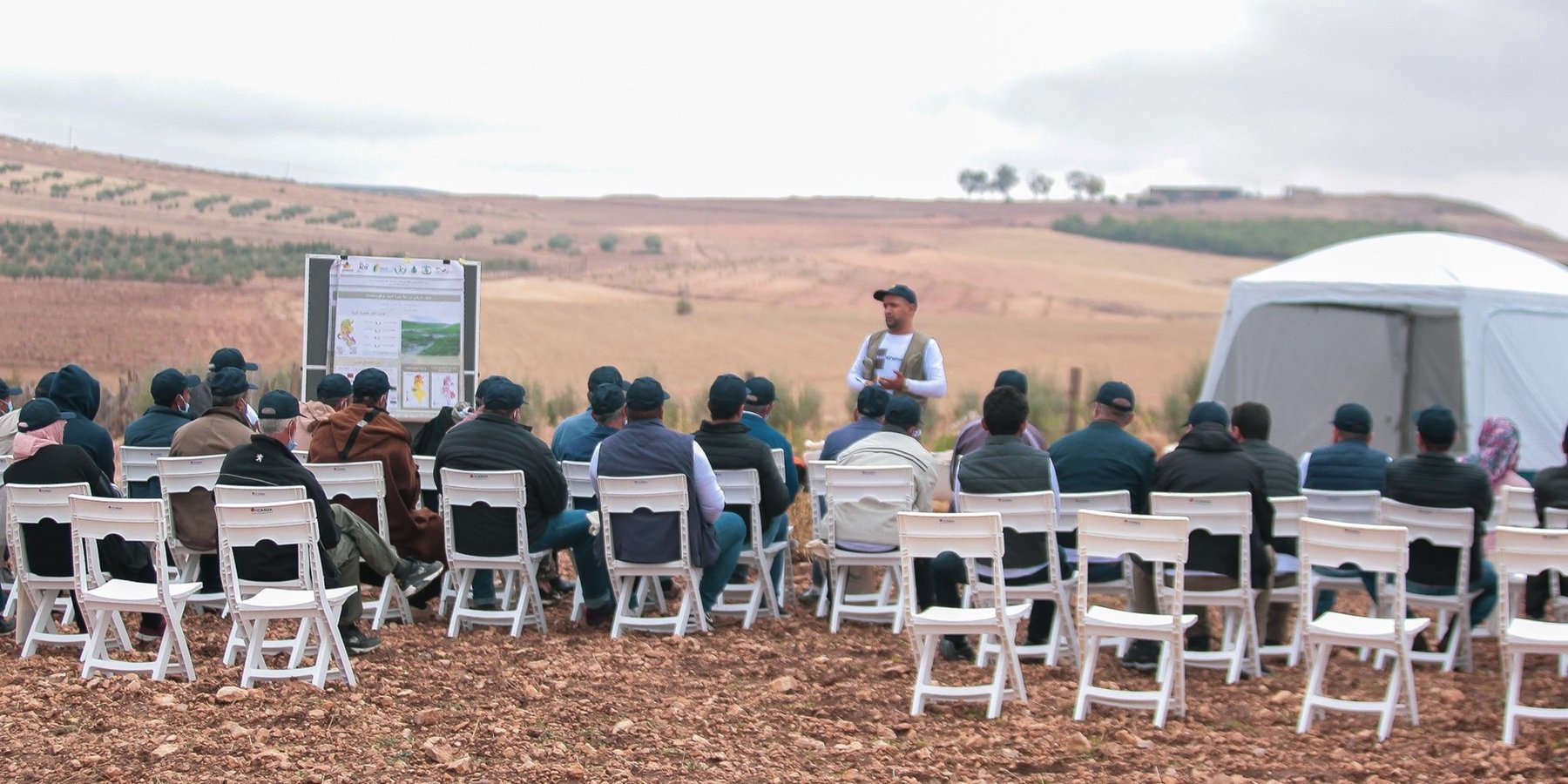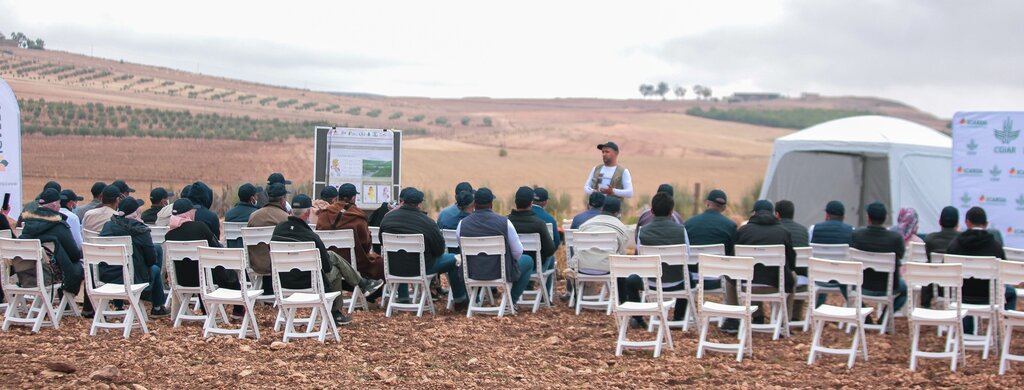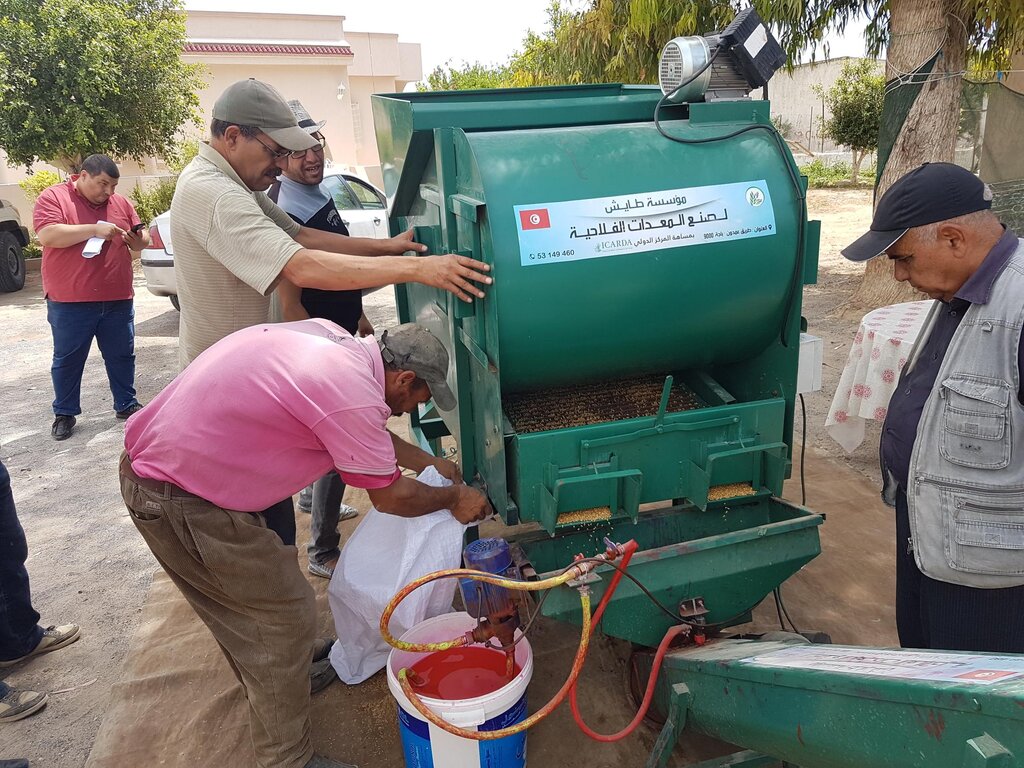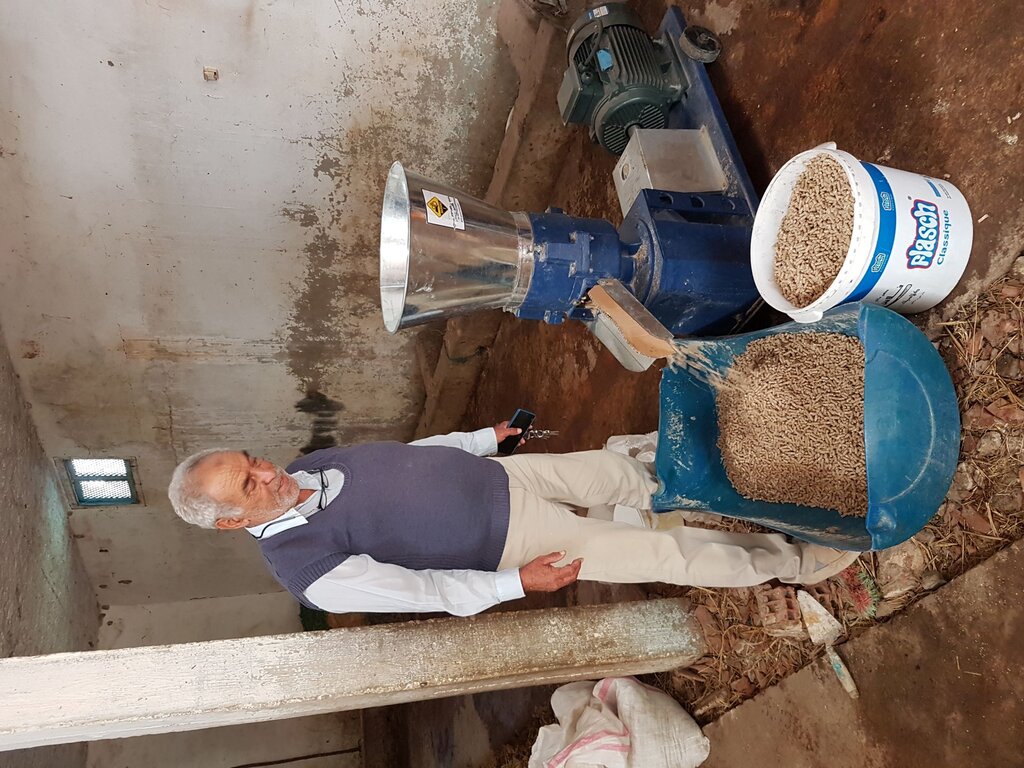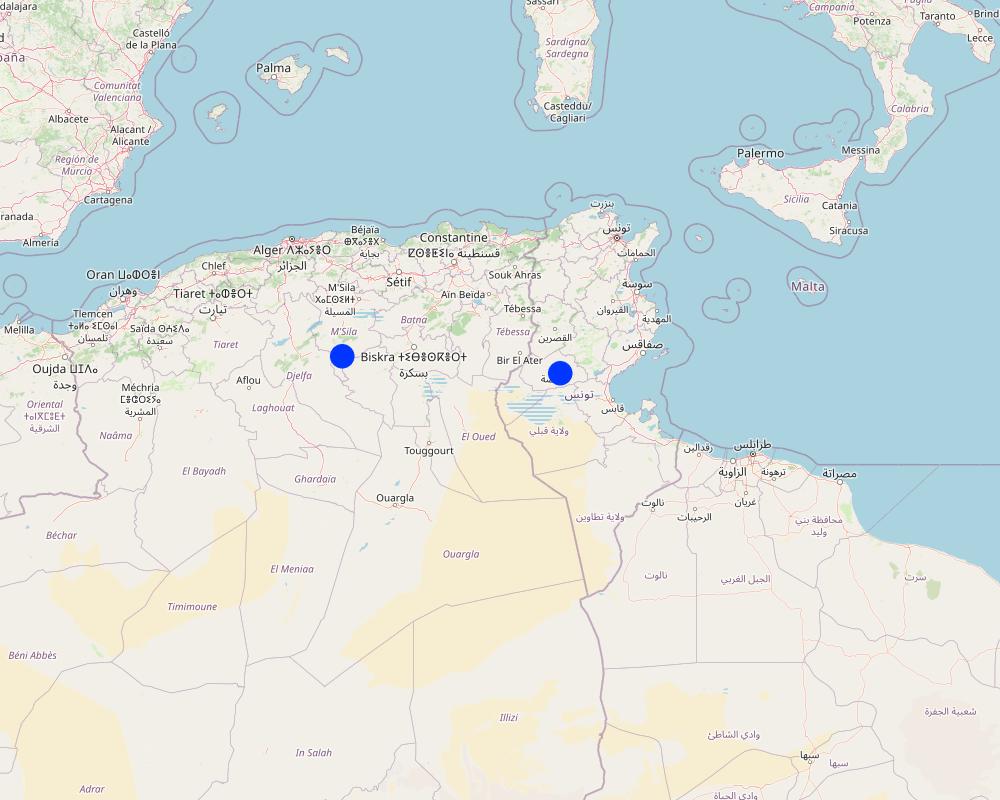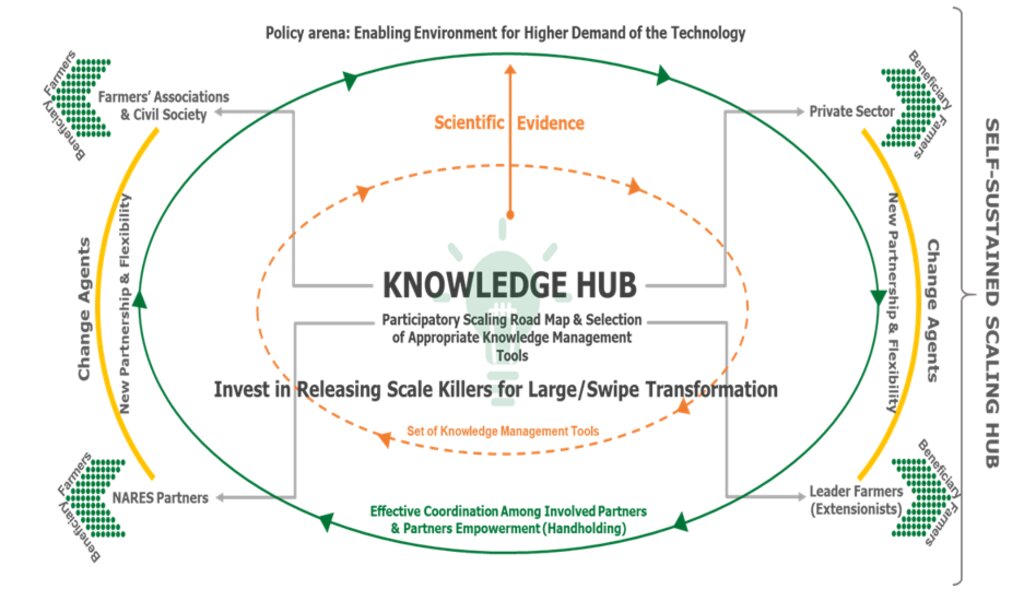The 4-Wheels Approach for sustainable scaling [Тунис]
- Создание:
- Обновить:
- Составитель: Joren Verbist
- Редактор: –
- Рецензенты: William Critchley, Rima Mekdaschi Studer
approaches_6885 - Тунис
Просмотреть разделы
Развернуть все Свернуть все1. Общая информация
1.2 Контактные данные специалистов и организаций, участвующих в описании и оценке Подхода
Ответственный (-ые) специалист (-ы)
Agricultural Economist:
Aymen Frija
International Center of Agricultural Research in Dry Areas (ICARDA)
Тунис
Specialist on Economics and Participatory Methods:
Idoudi Zied
International Center of Agricultural Research in Dry Areas (ICARDA)
Тунис
Agricultural Innovation Specialist:
Rudiger Udo
International Center of Agricultural Research in Dry Areas (ICARDA)
Тунис
Название проекта, содействовавшего документированию/оценке Подхода (если применимо)
ICARDA Institutional Knowledge Management InitiativeНазвание организации (-ий), содействовавших документированию/оценке Подхода (если применимо)
International Center for Agricultural Research in the Dry Areas (ICARDA) - Ливан1.3 Условия, регламентирующие использование собранных ВОКАТ данных
Когда были собраны данные (на местах)?
2022
Составитель и ответственный/-ые специалист(-ы) согласны с условиями, регламентирующими использование собранных ВОКАТ данных:
Да
1.4 Ссылка (-и) на Анкету (-ы) по Технологиям УЗП
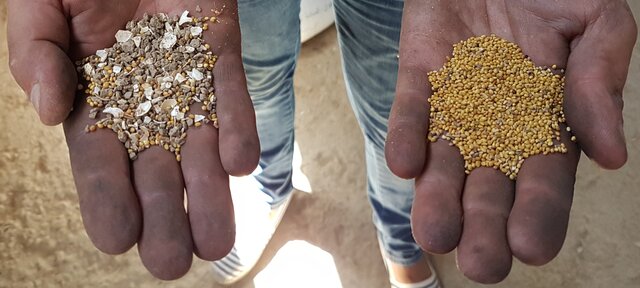
Small-Scale Seed Cleaning Unit [Тунис]
The mobile seed cleaning machine improves the livelihoods of smallholder farmers in Tunisia by significantly enhancing seed quality, increasing crop production, reducing workload and costs, and promoting local value chains and social cohesion.
- Составитель: Joren Verbist
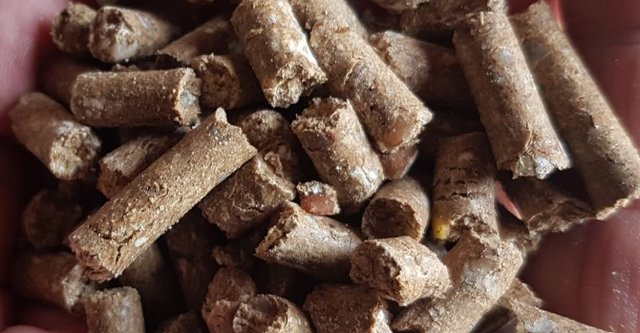
Small-Scale Nutrient-Dense Pellet Production [Тунис]
Compressing agro-industrial by-products produces nutrient-dense livestock feed pellets that can compete with expensive and imported alternatives. This innovation consists of a small-scale compressor or "pelletizer" and formulae to create feed pellets of sufficient quality with locally available inputs.
- Составитель: Joren Verbist
2. Описание Подхода УЗП
2.1 Краткое описание Подхода
The 4-Wheels Approach addresses the challenge of slow adoption of agricultural innovations among smallholder farmers by establishing Knowledge Hubs and partnerships with diverse stakeholders. The focus is on income-generating technologies and essential factors behind successful scaling up of innovations, ultimately driving agricultural modernization and sustainability.
2.2 Подробное описание Подхода
Подробное описание Подхода:
The challenge of low and slow adoption of innovations from agricultural research by smallholder farmers is difficult, complex, and is impeding the progress of agricultural modernization in many developing countries. This issue has negative consequences on farm productivity and farmers' livelihoods. Furthermore, it influences the outcomes of investments made by both national and international agricultural research and development initiatives. The problem is exacerbated by evolving climatic and social conditions, which makes more urgent the need for systemic transformation and modernization to enhance food production - while ensuring sustainability.
To confront this challenge of low rates of scaling up and adoption, the International Center of Agricultural Research in Dry Areas (ICARDA) introduced and validated the “4-Wheels Approach” in countries where ICARDA is active, including Algeria and Tunisia. Among other innovations, two types of machinery are being scaled up this way: (a) the pelletizer (which creates feed pellets from by-products) and (b) the seed cleaning machine (for mechanical seed cleaning, substantially reducing workload). Both technologies have been documented in WOCAT’s global database.
The 4-Wheels Approach is built upon Knowledge Hubs and dynamic partnerships. Knowledge Hubs encompass physical structures, such as (informal) training centres, which usually belong to local farmers’ associations and cooperatives. The purpose of these hubs is to refine and disseminate knowledge locally in a self-sustained way, potentially through established partnerships with key local and regional stakeholders and scaling partners. Four categories of stakeholders, also referred to as change-agents and facilitators of technology dissemination, are identified: i) farmers’ groups and various other local associations, ii) civil society (including non-governmental organizations (NGOs) and the private sector), iii) national public development partners, and iv) lead farmers and extensionists, all of whom play a pivotal role in holding the key knowledge about the technology and spreading it locally. Consequently, these Knowledge Hubs serve to further adapt and mainstream technical knowledge through intermediary beneficiaries (also called proxies or “ambassadors” of the technology), who in turn facilitate dissemination to the ultimate users and beneficiaries, namely the farmers. Viewing the approach’s scaling and Knowledge Hubs through this lens underscores the necessity of investing in continuous and comprehensive networking, which doesn’t overlook any of the possible and relevant scaling partners.
The implementation of the 4-Wheels Approach via Knowledge Hubs and collaborative partnerships has emerged as a compelling strategy for challenges in the uptake of agricultural innovations, fostering a sustainable pathway towards modernization, and thus uplifting the well-being of smallholder farmers in developing areas. The concepts of 4-Wheels Approach and Knowledge Hubs are closely related and interlinked/integrated. The participation of the four types of partners who are engaged through the 4-Wheels Approach within the Knowledge Hub activities allows them to better understand, participate and advocate for relevant local innovations. The 4-Wheels Approach ensures the concentrated involvement of scaling partners of different background within the same landscape, and thus efforts to engage innovation actors become more fruitful by being more accessible and inclusive.
Acknowledgement: This research was funded by the CLCA project (funded by IFAD), PROSOL (funded by GIZ), and OneCGIAR initiative on agroecology. All of the previous projects and initiatives are implemented and coordinated by the International Center for Agricultural Research in the Dry Areas (ICARDA). The projects partnered with national partners including the OEP (Office de l’elevage et des pâturages) for the training of the cooperatives, as well as Tunisia’s National Agricultural Research Institute (Institut National de la Recherche Agronomique en Tunisi, INRAT) and the National Institute of Field Crops (Institut National des Grands Cultures, INGC) which selected the cooperatives, and the Regional Department for Agricultural Development (Commissariat Regional de Développement Agricole, CRDA) which facilitated the access to farmers communities and creation of knowledge hubs. We would like to thank all partners for their contributions and collaboration.
2.3 Фотографии, иллюстрирующие Подход
2.5 Страна/ регион/ место, где применялся Подход
Страна:
Тунис
Map
×2.6 Даты начала и окончания реализации Подхода
Если год начала реализации Подхода достоверно неизвестен, дайте примерную оценку:
менее 10 лет назад (недавняя)
2.7 Тип Подхода
- в рамках проекта/ программы
2.8 Каковы цели/ задачи Подхода
The aim of this approach is to achieve sustainable scaling and foster greater adoption of innovations. This is pursued through the establishment of Knowledge Hubs (as spaces of innovation) where, the formation of partnerships (based on the 4-Wheels Approach), and the research into viable business models is carefully and step-wise implemented (in reference list see the protocol for implementation in Frija & Idoudi 2020).
2.9 Условия содействующие применению Технологии/ Технологий в рамках Подхода или затрудняющие его
Наличие/ доступность финансовых ресурсов и услуг
- затрудняют
A minimum of financial resources are needed to create and establish the knowledge hub in the form of informal training center at the cooperative and farmers association level. These fees aims at creating a local space for the community which can be “pedagogically” relevant for further exchange, discussions, trainings, and joint decision making by the community. Such spaces are material investments which can partly enhance the social capital and support the process of building collective cognitive capacity of farmers.
Институциональные условия
- затрудняют
The 4-Wheels Approach supports the process of technology transfers in countries where there is a lack of connections and collaboration between research and development. Under such institutional conditions where extension services are low and unavailable, and where research programs are disconnected from the real concrete problems and development bottlenecks, the 4-Wheels approach can be instrumental to leverage the public investments in technology transfers by creating local performing knowledge hubs which would remain sustainable thanks to the mobilization of all relevant innovation and scaling partners (as identified in the 4-wheel partners typology – see above
Сотрудничество/ координация действий
- содействуют
This was rather enabling as different actors like OEP (livestock agency) on the regional level as well as national level were always willing to collaborate with ICARDA and the different beneficiary communities of our different projects (listed in the acknowledgement). This is also especially relevant given that the early technologies for which we built and started piloting the concept of knowledge hubs and partnership for scaling were focusing on forage crops and forage mixtures . Also INRAT was happy to collaborate in the development of the concepts and to also facilitate the overall process of partners mobilization, including collaboration with private actor such as forage seeds companies, pelletizer or seed cleaning manufacturers etc
Осведомленность в области УЗП, доступность технической поддержки
- содействуют
Technical support was guaranteed by OEP, INRAT and ICARDA and private actor. The whole idea of these partners is to generate knowledge through experimentation and demonstration, and sustain it through capacity development and partnership/networking. Communities and particularly farmers associations were key in this regards as these are supposed to be the main holders of knowledge after the project ending. The whole process of creation of KHs aims at enhancing and sustaining knowledge about key agricultural practices and technologies locally, thus making it more inclusive and accessible.
Рынки (для приобретения материалов и услуг, продажи продукции) и цены
- содействуют
Theoretically, markets and prices are not key aspects since we are talking about knowledge. Currently, the problem is about access to lacking knowledge by smallholder farmers and is not about “price of the knowledge” or who is paying for it. However, scaling of KH themselves would involve the development of a business model in which “payment for knowledge” would be key for its scaling and sustainability.
3. Участие и распределение ролей заинтересованных сторон
3.1 Заинтересованные стороны, участвующие в реализации Подхода и их роли
- местные землепользователи/ местные сообщества
Farmer Cooperatives
Farmers communities, cooperatives and members are asked to engage into the participatory innovation process by defining their needs, problems, and helping to identify possible affordable solutions. They are also asked to offer a space of concentration where the overall R4D teams can meet, interact and discuss. This space is meant to be sustainable and will be used by the cooperative after the end of the project.
- ученые-исследователи
INRAT and OEP
Researchers are asked to facilitate the whole process of community engagement and Knowledge Hub installation. They are also asked to install some local experiments which can provide more contextual knowledge about technologies benefits and impact in specific localities. Researchers are also asked to design and facilitate appropriate networking event thus connecting the cooperatives with all relevant public and private actors who are operating for the considered technologies of the Knowledge Hub.
- частный сектор
Manufacturer of the seed cleaning unit and Importer of the Pelletizer machine
Private sector in general, supports the communities with some capacity development activities in case they are providers of the technology to be scaled (object of the Knowledge Hubs).
They also ensure good affordable and reliable access of farmers of the community to the relevant technologies object of the hub.
In this case, they did: design and produce, or import machine; train farmers in use and maintenance; perform after sale services
- международные организации
ICARDA
Lead and coordination; installation of the hub, facilitation between research and development actors; organize training and demonstration
Если участвовало несколько заинтересованных сторон, назовите ведущую организацию:
ICARDA
3.2 Участие местных землепользователей/ местных сообществ на разных стадиях реализации Подхода
| Участие местных землепользователей/ местных сообществ | Перечислите участников и опишите их вовлеченность | |
|---|---|---|
| инициирование/ мотивация | нет | ICARDA and OEP led discussion with the importer and manufacturer. |
| планирование | нет | Discussion between ICARDA, OEP, GIZ, INGC, to identify potential beneficiaries of the machines. |
| выполнение | интерактивное | ICARDA and OEP discussed with farmer cooperatives their interests in the machines. ICARDA, OEP, and manufacture produced and distributed the machines. Financial contribution of the farmer cooperation was requested to foster ownership. |
| мониторинг/ оценка | интерактивное | ICARDA and OEP visits the farmer cooperatives every three months to collect business data, see if the machine operates correctly, and to identify constraints. |
3.3 Схема реализации (если имеется)
Описание:
The 4-Wheels Approach for effective partnership for scaling
Автор:
Aymen Frija, Zied Idoudi. (18/12/2020). Self-Sustained “Scaling Hubs” for Agricultural Technologies: Defnition of Concepts, Protocols, and Implementation. (ICARDA)
3.4 Принятие решений по выбору Технологии/ Технологий УЗП
Укажите, кто принимал решение по выбору применяемой Технологии/ Технологий:
- исключительно специалисты по УЗП
Поясните:
ICARDA and partners investigated relevant and suitable technologies. Essential was that the business model is self-sustaining.
Поясните на чём было основано принятие решений:
- анализ подробно описанного опыта и знаний по УЗП (принятие решений на основе подтвержденных фактов)
- результаты исследований
- личный опыт и мнения (незадокументированные)
4. Техническая поддержка, повышение компетенций и управление знаниями
4.1 Повышение компетенций/ обучение
Проводилось ли обучение землепользователей/ других заинтересованных лиц?
Да
Укажите, кто проходил обучение:
- землепользователи
Если существенно, укажите гендерный и возрастной состав, статус, этническую принадлежность и т.д.
Farmers of the cooperation were trained
Тип обучения:
- в ходе работы
- опытные участки
- общие собрания
- курсы
Рассматриваемые темы:
The use of the machinery, their maintenance and recipes for pellets
4.2 Консультационные услуги
Есть ли у землепользователей возможность получать консультации?
Да
Укажите, где именно оказываются консультационные услуги:
- на полях землепользователей
4.3 Институциональная (организационная) поддержка
В ходе реализации Подхода были ли организованы новые институциональные структуры или поддержаны уже существующие?
- да, умеренно
Укажите уровень, на котором структуры были укреплены или вновь созданы:
- местные
Опишите организацию, функции и ответственность, членство и т.д.
Farmer cooperation and knowledge hubs were established. The rationale is that because the machines are economically viable on their own, the cooperation will keep on sharing the knowledge using the hubs.
Укажите тип поддержки:
- повышение компетенций/ обучение
- оборудование
4.4 Мониторинг и оценка
Являются ли мониторинг и оценка частью Подхода?
Да
Комментарии:
By monitoring certain indicators, such as the number of beneficiaries, pellets produced, seed cleaned, etc. In addition, ICARDA is frequently visiting the hubs to see progress and solve problems that occurred.
Если да, будет ли данный документ использоваться для мониторинга и оценки?
Да
4.5 Научные исследования
Были ли научные исследования частью Подхода?
Да
Укажите темы исследований:
- социология
- экономика / маркетинг
- экология
- технология
5. Финансирование и внешняя материальная поддержка
5.1 Годовой бюджет мероприятий по УЗП в рамках Подхода
Если точный годовой бюжет неизвестен, укажите примерный диапазон затрат:
- 10000-100000
Комментарий (например, основные источники финансирования/ ключевые доноры):
This includes the machines and trainings.
5.2 Финансирование и внешняя материальная поддержка, предоставляемая землепользователям
Предоставлялась ли землепользователям финансовая/ материальная поддержка для применения Технологии /Технологий?
Да
Если да, укажите тип(-ы) поддержки, кто ее предоставил и условия предоставления:
The land users, organized in farmer cooperation, were supported with machinery
5.3 Субсидии на отдельные затраты (включая оплату труда)
- оборудование
| Укажите, какие ресурсы были субсидированы | В какой степени | Опишите субсидии подробнее |
|---|---|---|
| техника | профинансированы частично | The farmer cooperatives made a financial contribution. |
5.4 Кредитование
Предоставлялись ли в рамках Подхода кредиты на мероприятия УЗП?
Нет
5.5 Другие методы или инструменты стимулирования
Использовались ли другие методы или инструменты стимулирования для продвижения Технологий УЗП?
Нет
6. Анализ влияния и заключительные положения
6.1 Влияние Подхода
Сумел ли Подход расширить возможности местных землепользователей, повысить участие заинтересованных сторон?
- Нет
- Да, немного
- Да, умеренно
- Да, существенно
Land users were empowered because the machines strengthen the cooperatives.
Сумел ли Подход помочь землепользователям внедрить и поддерживать технологии УЗП?
- Нет
- Да, немного
- Да, умеренно
- Да, существенно
Сумел ли Подход расширить знания и возможности землепользователей в применении практик УЗП?
- Нет
- Да, немного
- Да, умеренно
- Да, существенно
Farmers received training on how to operate and maintain the machinery, but they are still struggling with the optimal recipes for the pellets.
Сумел ли Подход укрепить сотрудничество между заинтересоваными сторонами/ выстроить механизмы сотрудничества?
- Нет
- Да, немного
- Да, умеренно
- Да, существенно
The projects was a successful collaboration between many different organization. Its success has strengthen the relations.
Сумел ли Подход содействать гендерному равенству и расширить права и возможности женщин и девочек?
- Нет
- Да, немного
- Да, умеренно
- Да, существенно
Conventionally, the cleaning of seeds was done by hand by women and children. The use of machinery has substantially lowered their workload.
Сумел ли Подход способствовать улучшению продовольственой безопасности/ качества питания?
- Нет
- Да, немного
- Да, умеренно
- Да, существенно
The use of the machinery lead to improved food security.
6.2 Основные причины, побуждающие землепользователей внедрять УЗП
- рост продуктивности
- рост прибыли (доходности) и рентабельности
- снижение риска катастрофических погодных явлений
- снижение объёма работ
6.3 Долгосрочная устойчивость мероприятий в рамках Подхода
Могут ли землепользователи самостоятельно (без внешней поддержки) продолжать применение того, что было реализовано в рамках Подхода?
- да
Если да, опишите как:
The machines on their self are economically viable.
6.4 Сильные стороны/ преимущества Подхода
| Сильные стороны/ преимущества/ возможности по мнению землепользователей |
|---|
| Seed Cleaning Unit: better seeds, improves yield, higher income, less workload |
| Feed Pelletizer: use of agricultural by-products, cheap compound feed, less workload |
| Сильные стороны/ преимущества/ возможности по мнению составителя или других ключевых специалистов |
|---|
| Major strength of the 4-Wheels approach is the aspect of the collaboration, between private actor (machine manufacturer or importer), farmer organization, lead farmer of the organization, OEP (extension), INRAT (research for composition). This multi-actor collaboration is key of the 4-wheel approach and key of the success of the scaling of the two technologies |
| Seed Cleaning Unit: better seeds, improves yield, higher income, less workload |
| Feed Pelletizer: use of agricultural by-products, cheap compound feed, less workload |
| The 4-Wheels Approach ensures ownership over the machinery while building capacity |
6.5 Слабые стороны/ недостатки Подхода и пути их преодоления
| Слабые стороны/ недостатки/ риски по мнению землепользователей | Возможные пути их преодоления/снижения? |
|---|---|
| Feed Pelletizer: Farmers still don’t know the optimum mixture of ingredients to produce pellets for each region and categories of animals (sheep / cow / camel). | Intense collaboration with agricultural research |
| Слабые стороны/ недостатки/ риски по мнению составителя или ответственных специалистов | Возможные пути их преодоления/снижения? |
|---|---|
| A risk of the approach is the sustainability. It is not sure (yet) if and how the knowledge hub will continue once there is no more support from ICARDA and (national) partners. |
The theoretical idea is that through the income generation with these machines they (farmer organization) will continue training others and sharing their knowledge. But this theory needs to be validated and proven. |
| Seed Cleaning Unit: quite expensive for a small scale farmer (7,000 US$ nowadays) | To buy the unit as a farmer organization (cooperation) and use it by many farmers |
| The Feed Pelletizer can be expensive for individual small scale farmer, availability of spare parts of pelletizing machine only in Tunis (access problem), needs available by-products (they are only seasonable), need access to subsidized barley and wheat bran to produce at competitive prices. Farmer organizations have no quota for subsidized barley and wheat bran, only individual farmers to a limited amount and feed enterprises | To use the feed pelletizer as a group to reduce costs per farmer; transform cooperative into a feed processing enterprise as they have access to subsidized barley and wheat bran |
7. Справочные материалы и ссылки
7.1 Методы сбора/источники информации
- опросы специалистов/экспертов по УЗП
- данные, собранные из отчетов и достоверных документов
7.3 Ссылки на материалы, доступные онлайн
Название/ описание:
Aymen Frija, Zied Idoudi. (18/12/2020). Self-Sustained “Scaling Hubs” for Agricultural Technologies: Definition of Concepts, Protocols, and Implementation. Lebanon: International Center for Agricultural Research in the Dry Areas (ICARDA).
Адрес в сети Интернет:
https://hdl.handle.net/20.500.11766/12248
Название/ описание:
Mourad Rekik, Aymen Frija, Zied Idoudi, Santiago López Ridaura, Nasreddine Louahdi, Boubaker Dhehibi, Dina Najjar, Udo Rudiger, Enrico Bonaiuti, Laura Becker, Zohra Djender Ghallem, Hatem Cheikh M'hamed, Mina Devkota Wasti, Barbara Rischkowsky. (11/3/2021). Use of Conservation Agriculture in Crop-Livestock Systems (CLCA) in the Drylands for Enhanced Water Use Efficiency, Soil Fertility and Productivity in NEN and LAC Countries – Progress Highlights: Year (3) - April 2020 to March 2021. Lebanon: International Center for Agricultural Research in the Dry Areas (ICARDA).
Адрес в сети Интернет:
https://hdl.handle.net/20.500.11766/12703
Название/ описание:
Aymen Frija, Zied Idoudi, Udo Rudiger, Jebali Oussama, Hatem Cheikh M'hamed, Haithem Bahri, Boubaker Dhehibi, Mourad Rekik, Imen Hemissi, Salah Ben Youssef, Khouloud Chetoui, Mounir Louhaichi, Mouldi Gamoun, Asma Souissi. (6/12/2022). Soil Protection and Rehabilitation of Degraded Soil for Food Security – ProSol: Towards the Effective Scaling of Soil and Water Conservation Technologies under Different Agroecosystems in North and Central West Tunisia – SWC@Scale/ProSol: Technical Progress Report/ January – August 2022. Beirut, Lebanon: International Center for Agricultural Research in the Dry Areas (ICARDA).
Адрес в сети Интернет:
https://hdl.handle.net/20.500.11766/67835
Ссылки и модули
Развернуть все Свернуть всеСсылки

Small-Scale Seed Cleaning Unit [Тунис]
The mobile seed cleaning machine improves the livelihoods of smallholder farmers in Tunisia by significantly enhancing seed quality, increasing crop production, reducing workload and costs, and promoting local value chains and social cohesion.
- Составитель: Joren Verbist

Small-Scale Nutrient-Dense Pellet Production [Тунис]
Compressing agro-industrial by-products produces nutrient-dense livestock feed pellets that can compete with expensive and imported alternatives. This innovation consists of a small-scale compressor or "pelletizer" and formulae to create feed pellets of sufficient quality with locally available inputs.
- Составитель: Joren Verbist
Модули
Нет модулей


